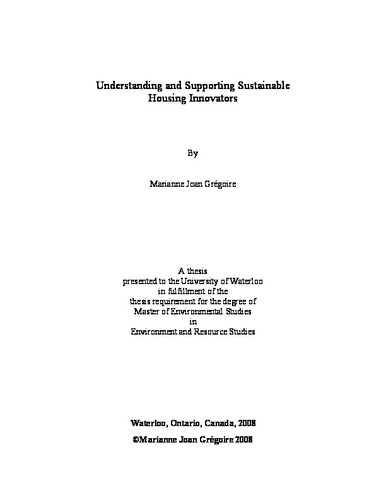| dc.description.abstract | Canadian societies have developed a paradoxical relationship with change, where we commend “bold and visionary” leaders and adventurers, yet staunchly resist major change in our own lives. Nonetheless, instances of extensive and pervasive societal change inevitably occur. A notable example of current change is sustainable housing, now appearing in various forms throughout a diverse cross-section of society. This movement is in a period of growth and so there is still much to learn about how concepts of sustainability will take hold, and in terms of understanding who are effecting the changes we are starting to experience. Significantly, housing represents a sector that is directly linked to physical health, happiness, the economy and sustainability.
Innovation has been the flash point for progress since the dawn of time. Advancement in thinking moves like a relay hurdler, taking even measured logical steps forward until periodically there is a leap, a movement up and over an obstacle into a new zone before the baton is passed to the next runner. These innovators present a new direction of thought and action, and challenge established procedures and routines. The aim of this thesis is to identify and understand influential sustainable housing innovators in order to determine whether it is possible to support them deliberately. The intended use of the results is to determine practical guidelines for sustainable housing innovators and organizations in hopes of improving their influence in the conventional housing arena.
A varied and extensive literature review identifies key characteristics of societal leaders and innovators. Case studies, from North America and the Region of Waterloo focusing on the profiles of innovators from the sustainable housing sector are considered in the context of those characteristics. Primary data collection consisted of interviews and personal observations of several sustainable housing groups. Six key characteristics were found in influential sustainable housing innovators. Four were highlighted in the literature search (i.e. possessing charisma, a goal oriented personality and environmental ethic, and a willingness to share knowledge). Two more were derived from the primary data collection (i.e. community awareness and exceptionally effective collaborators and facilitators an ability to be an effective collaborator/facilitator). Results reveal that sustainable housing innovation may be integrated more effectively into mainstream practice in two ways: one, through education and marketing to reduce resistance from fear of the unknown and two, with the introduction of an intermediary moderator between innovators and official city or government decision makers. This study concludes that there are common key characteristics among influential sustainable housing innovators. Understanding those characteristics that identify such innovative leaders is an important step toward mainstream acceptance of sustainable housing. | en |

